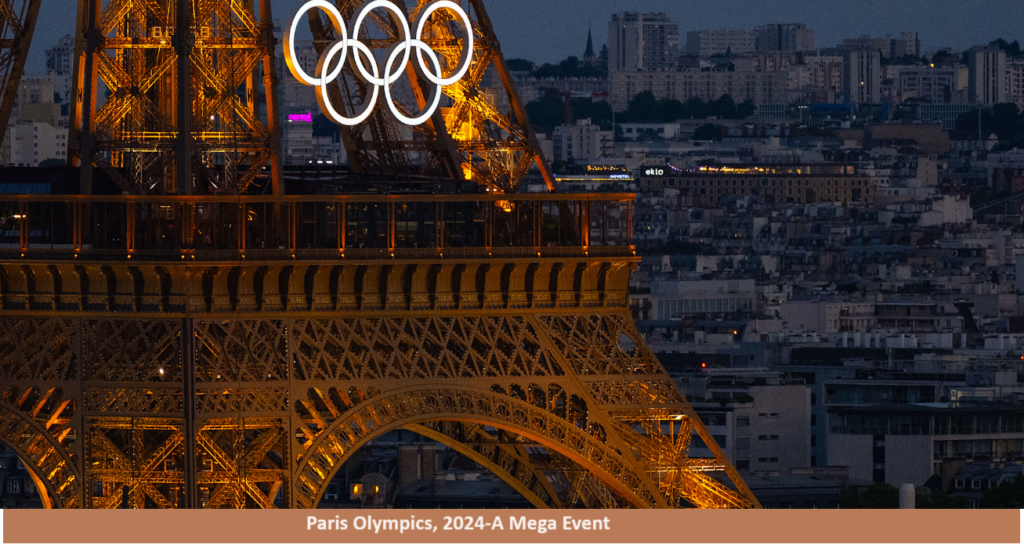The opening ceremony of the French Olympics (Paris 2024) will be held on Friday, July 26, 2024, starting at 7:30 PM GMT (Greenwich Mean Time).
The Paris 2024 Olympics promise to be a spectacular celebration of sport, culture, and international camaraderie. As the City of Light prepares to host athletes from around the globe, here are some highlights and interesting facts:
Historic Venue:
- The river parade route is 6 Km from east to west
- Paris, with its rich history and iconic landmarks, provides a fitting backdrop for the Games.
- The Eiffel Tower, the Louvre, and the Champs-Élysées will share the spotlight with athletic arenas.
Innovations:
- Paris 2024 aims to be environmentally conscious, emphasizing sustainability and green initiatives.
- First time in the history of Olympic games, the opening ceremony will not be held in a Stadium but it is set to be along the heart of Paris, The Seine River
- The Seine River will host open-water swimming events, showcasing the city’s natural beauty.
- Athletes from 206 National Olympic Committees (NOCs) and around 120 heads of heads of government will attend the ceremony and games.
Sports and Athletes:
- Athletes will compete in a wide range of sports, from track and field to gymnastics, swimming, and cycling.
- This time athletes will be opening the ceremony.
- 80 big screens will be placed in the city and speakers installed at various important locations.
- The Olympic Village will buzz with diverse cultures, languages, and shared dreams.
French Vocabulary:
- If you’re heading to Paris, here are a few French words related to the Olympics:
- Les Jeux Olympiques: The Olympic Games
- La cérémonie d’ouverture: Opening Ceremony
- La cérémonie de clôture: Closing Ceremony
- Le village olympique: Olympic Village
- Le porte-drapeau: Flag Bearer
| English Word | French Meaning |
| Hello / Good morning! | Bonjour! |
| Good evening! | Bonsoir! |
| Yes | Oui |
| No | Non |
| Excuse me | Excusez-moi |
| I’m sorry | Je suis desole |
| Thank You | Merci |
| Please | S’il vous plait |
A Brief History of the Olympic Games
Ancient Origins:
- The Olympic Games trace their roots back nearly 3,000 years to ancient Greece.
- The original Games were held in Olympia, a sacred site dedicated to Zeus, the Greek god of sky and weather.
- Athletes from various city-states competed in events like wrestling, boxing, long jump, javelin, discus, and chariot racing.
Revival and Modern Olympics:
- French historian Pierre de Coubertin played a pivotal role in reviving the Olympic spirit.
- In 1894, he founded the International Olympic Committee (IOC), leading to the first modern Games in Athens in 1896.
- Since then, the Olympics have become the pinnacle of global sporting events.
Evolution and Adaptation:
- The Olympic Movement has evolved over the 20th and 21st centuries.
- Winter Olympics were introduced for snow and ice sports.
- Paralympic Games provide a platform for athletes with disabilities.
- Youth Olympics engage young talents aged 14 to 18.
- Continental Games (Pan American, African, Asian, European, and Pacific) celebrate regional excellence.
Challenges and Resilience:
- World Wars disrupted the Games (1916, 1940, and 1944).
- Cold War boycotts affected participation (1980 and 1984).
- The COVID-19 pandemic led to the postponement of the 2020 Olympics to 2021.
Legacy and Unity:
- The Olympic Movement unites international sports federations, National Olympic Committees, and passionate fans.
- It transcends borders, languages, and cultures, celebrating human achievement and perseverance.

